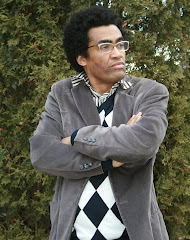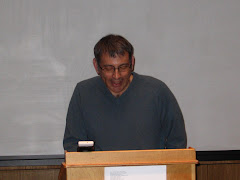In his first appearance at the New Writing Series, Thomas Sayers Ellis displayed a range for talent and expression last Wednesday at Barrows Hall in a presentation apart of the New Writing Series on March 26th.
Mr. Ellis’s performance blended together a rhythmically unique emphasis of words with musicality and comedic insight throughout his poetry, to captivate an audience of over 100 for over 40 minutes.
Ellis’s poems in his collection “The Maverick Room,” are meant to be identity repair poems for him, Ellis said, where he integrates slang and musicality to move his words in a vernacular tone. First, Ellis read poem “Audience,” from his new manuscript “Colored Only,” where he reflected his own race and identity but also called the audience to reflect their own as well.
Before his next poem, Ellis explained how he spent a summer at Yaddo, an artist’s community located in Saratoga Springs, New York. He was given Syliva Plath’s workroom and Elizabeth Bishop’s bedroom on the estate. In being haunted and perhaps influenced by the poetic genius’s he wrote the poem “All Their Stanza’s Look Alike.”
Ellis rhythmically emphasized this poem to a strong degree, as he repeated the line “all their stanza’s look alike,” and slightly heightened or moderated his intonation and tone to give the poem momentum and its musical feel. The poem calls to mind his cultural observations of stereotypes:
“All their fences, All their prisons, All their exercises, All their agendas, All their stanzas look alike, All their metaphors, All their bookstores, All their plantations, All their assassinations, All their stanzas look alike,”
Also a photographer, Ellis’s poem “Balloon Dog,” reflected a certain vibe in his words as well as they moved with a similar rhyme intonation as his previous poem. The poem calls to mind an idea to escape the confines of an artist’s ego and to find the genuine feeling and truth behind the words and meaning.
Before reading his poem, “Pack of cigarettes,” Ellis explained his inspiration for the poem was derived from his understanding of street gangs becoming bands who used music as a form of expression, because street gangs were becoming bands and doo-hop groups. The poem reflects how segregation influenced gangs to form, and how music was maybe an escape from the oppression of segregation.
Ellis said his poems are reflections of the spoken word vs. the written word, and that “the line is a breathing walk of language. Poetry and writing is a dead object in need to be made alive.” Ellis said.
The performances of Mr. Ellis heighten his poetry as he “makes the word move on the page,” he adds. Ellis believes also that he can’t read the same poem twice in the same way, and that he’s not accepting of linearity, he say’s that stanza’s are in little boxes and are trapped in books. Ellis thus uses performance, musicality and expression of unique intonations to explore the possibilities of his writing. “Performance is something that encourages the ideas of your poetry; how do you construct the intonation to the writing aspect of it.” Ellis said.
Before introducing his next poem about James Brown, a student started to walk out the door, he shouted to him that he should stay and he asked him to sit down, as the student had a confused smile on his face, Ellis told him he could go and that no one should leave during a James Brown poem, then he said, “oh no sorry it’s a Kurt Coban poem!” Ellis poked fun with the audience throughout the night.
Ellis explained to the audience before his last poem that his Father worshiped James brown, and that the first schooling he ever undertook was the school of James brown and his music. He said that his Father may have received a 9th grade education, but that he was a student of sound.
In having to write a poem about James Brown for The Nation, after his death, James Brown’s family had to wait to bury him while he was in the process of figuring what to write about, he said “The godfather wouldn’t go down,” and said that it wasn’t until he was buried he had the idea for the poem.
Although I was nervous I spoke with Mr. Ellis after the show. I talked with him about writing and how performance of poetry heightens the presentation of his poetry but poetry in general. In doing more research about the poet after I spoke with him, I learned that he also was an assistant to Spike Lee when he taught at Harvard University. In being a fan of Spike Lee, I would’ve liked to know what this experience was like for him.



1 comment:
I love how you added the pictures!
Post a Comment